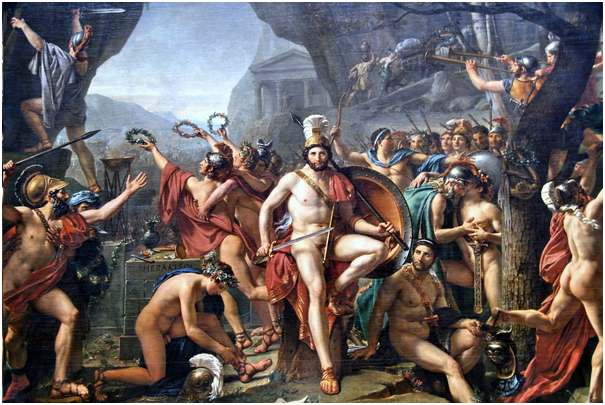 You might think that “rhetoric” and “oratory” came from the same linguistic root. But it appears not, which is fitting, considering the difference in meaning. Scholars tell us that rhetoric comes from the hypothetical IndoEuropean root WER, meaning to speak, and oratory from ŌR, meaning a sound, or more specifically a ritual formula, particularly one emanating from a god, related to ŌS, a mouth.
You might think that “rhetoric” and “oratory” came from the same linguistic root. But it appears not, which is fitting, considering the difference in meaning. Scholars tell us that rhetoric comes from the hypothetical IndoEuropean root WER, meaning to speak, and oratory from ŌR, meaning a sound, or more specifically a ritual formula, particularly one emanating from a god, related to ŌS, a mouth.
In Greek ŌR gave ἀρά, a prayer, and ἄρασθαι, to pray. From the Latin orare, to pray, came the diminutive oraculum, a divine utterance, transmitted via a priest or priestess in a temple or shrine, like the Sibylline prophecies made at Apollo’s shrine in Delphi.
“Oratory” was first used in English in about 1380 to describe a place of prayer, such as a small chapel or shrine in a house, church, or monastery. It took another 150 or so years before it came to mean the art of an orator or public speaking. Later it was also used to refer to a folding stool on which you would kneel to pray. The word oracle made its appearance about 40 years after oratory. Later came oral, orality, orans or orant (an image of a person at prayer with outstretched arms), orarium (an eccelsiastical stole), orate, oration, oratorical, oratiuncle (a short oration), and orisons. Something once said persists inexorably. To adore is to express reverence. Isadora Duncan’s six acolytes were her Isadorables. Os means a mouth; the uterus has two, internal and external, and the body has other orifices. To osculate is to kiss. Oscitancy is drowsiness, making you yawn. Orotund is round mouthed—pompous, bombastic.
In Greek WER gave εἴρειν, to say or speak, εἴρων, one who says less than he thinks, a dissembler, and εἰρωνεία, dissimulation, from which we get irony. Fittingly, irony is a rhetorical trope, defined in the OED as “the expression of one’s meaning by using language that normally signifies the opposite, typically for humorous or emphatic effect.”
In Latin WER gave verbum, a word, whence verb, adverb, and proverb, the German word wort, the Scandinavian word ord, and the English word word. Verve was originally a special talent for writing and great vivacity of ideas and expression. Metathesis gave WRE, and a suffixed form, WRE-TOR, gave the Greek ῥητορεία, oratory, and the adjective ῥητορικός; ῥητορικὴ τέχνη was the rhetorical art, shortened to the noun ῥητορικὴ, rhetoric.
Although “rhetoric” entered English in about 1330, 50 years earlier than “oratory”, practical rhetoric was probably preceded by orality, in works composed by poets and preachers and originally transmitted by word of mouth. The Hebrew name of the Biblical text we call Ecclesiastes was קוהלת (Koheleth), meaning one who assembles the people, translated in the Authorized Version as “preacher”. And, as Milman Parry demonstrated, Homer’s Iliad and Odyssey were probably assemblages of oral texts by several authors. Could that be true of the Hippocratic Corpus?
During the second Persian invasion of Greece by Xerxes I in 480 BC, a troop of 7000 Greek soldiers, under the command of the Spartan leader Leonidas (picture), held the pass of Thermopylae for seven days, while the Greek navy under Themistocles was holding the Persians off at the Straits of Artemisium. They were defeated when a traitor, Ephialtes, told the Persians how to circumvent the pass. The poet Simonides of Ceos wrote their epitaph:
ὦ ξεῖν’ ἀγγέλλειν Λακεδαιμονίοις ὅτι τῇδε κείμεθα τοῖς κείνων ῥήμασι πειθόμενοι
Oh stranger, tell the Spartans that we lie here, from obeying their orders.

The word ῥήμασι is a plural form of ῥῆμα, a word or saying and hence an order. Rhematic, a word coined by Coleridge, was the study or application of clarity of expression. Rheme, a term in logic that the American philosopher Charles Sanders Peirce introduced in 1892, is a sign or part of a sentence or proposition, expressing a particular concept or idea. But there is a related Greek word, ῥήτρα, which meant agreement or a bargain or covenant, used in Sparta to refer to any royal decree. Leonidas’s men gave their word and kept it, unlike many politicians. Their deeds were the physical equivalent of oratory opposing the Persian rhetoric.
Jeffrey Aronson is a clinical pharmacologist, working in the Centre for Evidence Based Medicine in Oxford’s Nuffield Department of Primary Care Health Sciences. He is also president emeritus of the British Pharmacological Society.
Competing interests: None declared.
